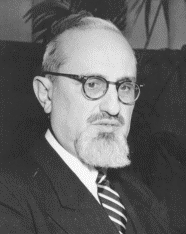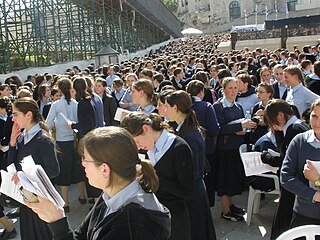A rabbi is a spiritual leader or religious teacher in Judaism. One becomes a rabbi by being ordained by another rabbi—known as semikha—following a course of study of Jewish history and texts such as the Talmud. The basic form of the rabbi developed in the Pharisaic and Talmudic eras, when learned teachers assembled to codify Judaism's written and oral laws. The title "rabbi" was first used in the first century CE. In more recent centuries, the duties of a rabbi became increasingly influenced by the duties of the Protestant Christian minister, hence the title "pulpit rabbis", and in 19th-century Germany and the United States rabbinic activities including sermons, pastoral counseling, and representing the community to the outside, all increased in importance.

Haredi Judaism consists of groups within Orthodox Judaism that are characterized by their strict interpretation of religious sources and their accepted halakha and traditions, in opposition to more accommodating or modern values and practices. Its members are usually referred to as ultra-Orthodox in English; however, the term "ultra-Orthodox" is considered pejorative by many of its adherents, who prefer terms like strictly Orthodox or Haredi. Haredi Jews regard themselves as the most religiously authentic group of Jews, although other movements of Judaism disagree.

A yeshiva is a traditional Jewish educational institution focused on the study of Rabbinic literature, primarily the Talmud and halacha, while Torah and Jewish philosophy are studied in parallel. The studying is usually done through daily shiurim as well as in study pairs called chavrusas. Chavrusa-style learning is one of the unique features of the yeshiva.

A kollel is an institute for full-time, advanced study of the Talmud and rabbinic literature. Like a yeshiva, a kollel features shiurim (lectures) and learning sedarim (sessions); unlike most yeshivot, the student body of a kollel typically consists mostly of married men. A kollel generally pays a regular monthly stipend to its members.

Torah study is the study of the Torah, Hebrew Bible, Talmud, responsa, rabbinic literature, and similar works, all of which are Judaism's religious texts. According to Rabbinic Judaism, the study is done for the purpose of the mitzvah ("commandment") of Torah study itself.
Modern Orthodox Judaism is a movement within Orthodox Judaism that attempts to synthesize Jewish values and the observance of Jewish law with the modern world.

Joseph Ber Soloveitchik was a major American Orthodox rabbi, Talmudist, and modern Jewish philosopher. He was a scion of the Lithuanian Jewish Soloveitchik rabbinic dynasty.

Azriel Hildesheimer was a German rabbi and leader of Orthodox Judaism. He is regarded as a pioneering moderniser of Orthodox Judaism in Germany and as a founder of Modern Orthodox Judaism.

Bais Yaakov is a genericized name for full-time Haredi Jewish elementary and secondary schools for girls throughout the world.

A cheder is a traditional primary school teaching the basics of Judaism and the Hebrew language.
Hebrew school is Jewish education focusing on topics of Jewish history, learning the Hebrew language, and finally learning their Torah Portion, in preparation for the ceremony in Judaism of entering adulthood, known as a Bar or Bat Mitzvah. Hebrew School is usually taught in dedicated classrooms at a Synagogue, under the instruction of a Hebrew teacher, and often receives support from the cantor for learning the ancient chanting of their Torah portion, and from the rabbi during their ceremony since they must read from a Torah scroll, which has no Hebrew vowels, and very close together text and minimal line spacing; making it very challenging for almost anyone to read from.
Midrasha is a Hebrew term currently used for three types of educational institutions:
- Torah study institutions for women of post-high-school age. Also called "seminaries".
- Informal education colleges and institutions.
- Israeli field schools focused on nature and ecology who hold seminars and organize field trips.
Rabbi Isaac Elchanan Theological Seminary is the rabbinical seminary of Yeshiva University (YU). It is located along Amsterdam Avenue in the Washington Heights neighborhood of Manhattan, New York City.

Torah Umesorah – National Society for Hebrew Day Schools is an Orthodox Jewish educational charity based in the United States that promotes Torah-based Jewish religious education in North America by supporting and developing a loosely affiliated network independent private Jewish day schools.

Jewish education is the transmission of the tenets, principles, and religious laws of Judaism. Jews value education, and the value of education is strongly embedded in Jewish culture. Judaism places a heavy emphasis on Torah study, from the early days of studying the Tanakh.

The baal teshuva movement is a description of the return of secular Jews to religious Judaism. The term baal teshuva is from the Talmud, literally meaning "master of repentance". The term is used to refer to a worldwide phenomenon among the Jewish people.
Machon Chana is a private religious college for Jewish women affiliated with the Chabad Hasidic movement and geared toward Baalot Teshuva – women from secular backgrounds who become more observant. The school is located in the Crown Heights neighborhood of Brooklyn, New York.
Mesivta is an Orthodox Jewish yeshiva secondary school for boys. The term is commonly used in the United States to describe a yeshiva that emphasizes Talmudic studies for boys in grades 9 through 11 or 12; alternately, it refers to the religious studies track in a yeshiva high school that offers both religious and secular studies.

Orthodox Jewish philosophy comprises the philosophical and theological teachings of Orthodox Judaism. Though Orthodox Judaism sees itself as the heir of traditional rabbinic Judaism, the present-day movement is thought to have first formed in the late 18th century, mainly in reaction to the Jewish emancipation and the growth of the Haskalah and Reform movements. Orthodox Jewish philosophy concerns itself with interpreting traditional Jewish sources, reconciling the Jewish faith with the changes in the modern world and the movement's relationships with the State of Israel and other Jewish denominations.











